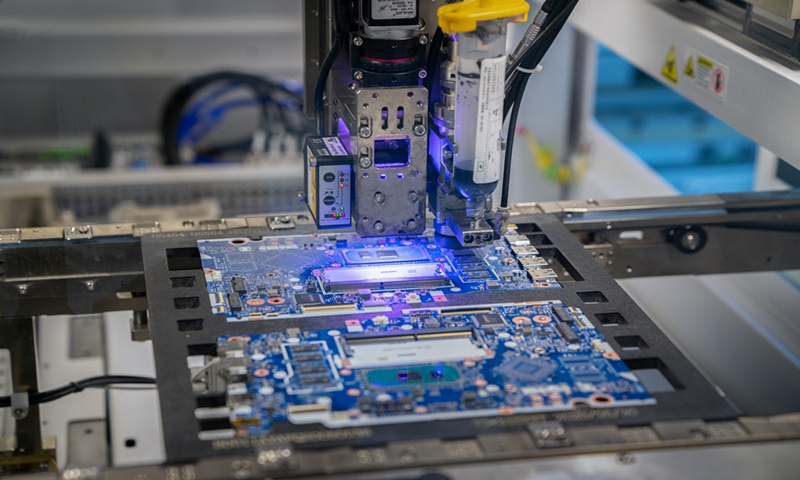
A chip manufacture machine Photo: VCG
China has made clear its serious position more than once on the US' malicious blocking and suppression of China's semiconductor industry. The US has politicized trade and tech issues, overstretched the concept of security and used these issues as tools, stepping up chip export controls against China and coercing other countries into going after China's semiconductor industry. Such moves hinder the development of the global semiconductor industry, and will backfire and hurt the US itself as well as others in the end, Lin Jian, spokesperson of China's Foreign Ministry, said on Tuesday.
Lin made the remarks in response to a question from Bloomberg about how US President Donald Trump's administration is sketching a tougher version of curbs on semiconductors and pressuring key allies to escalate their restrictions on China's chip industry.
A Chinese expert said on Tuesday that the latest US move will be counterproductive and will further jeopardize its interests and those of its allies, warning that the protectionist US approach will disrupt global supply chain cooperation, and stifle innovation and growth in the semiconductor sector.
Trump officials recently met with their Japanese and Dutch counterparts about restricting Tokyo Electron and ASML Holding engineers from maintaining semiconductor gear in China, according to people familiar with the matter. The aim, which was also a priority for former US president Joe Biden, is to see key allies match China curbs the US has placed on American chip-gear companies, including Lam Research Corp, KLA Corp and Applied Materials Inc, Bloomberg reported.
It could take months before the talks produce any new US regulations, as Trump makes staffing decisions at key federal agencies. It also remains to be seen whether allies will be more receptive to the new leadership in Washington, according to Bloomberg.
Ma Jihua, a veteran telecom industry observer, told the Global Times on Tuesday that the US move to pressure its allies to jointly tighten restrictions on China's chip industry may be difficult to enforce, as chip companies in these allied countries know that such measures would inevitably result in losing access to the Chinese market, harming their own economic interests.
According to Bloomberg, the prior administration had reached a handshake agreement with the Hague on limiting gear maintenance in China, but the Dutch demurred after Trump won the election, two senior Biden officials said.
Ma noted that if these companies halt maintenance services for semiconductor equipment in China under pressure from the US, they may be compelled to cut sales in China, damaging their global reputation.
On Friday, Trump signed a memorandum directing the Committee on Foreign Investment in the US to curb Chinese investments in strategic sectors. The Trump administration will consider new or expanded restrictions on US outbound investment to China in sensitive technologies, including semiconductors, artificial intelligence, quantum, biotechnology, aerospace, and more.
China's Foreign Ministry and Ministry of Commerce both slammed the US move, urging the US to stop politicizing and weaponizing economic and trade issues.
In addition, Reuters reported on Monday that a bipartisan group of lawmakers is introducing legislation on Monday to toughen US trade enforcement laws and address the impact of Chinese-supported companies moving portions of their production to other countries to circumvent American duties.
The Biden administration on January 13 released an Interim Final Rule on Artificial Intelligence Diffusion on the website of the White House, which would further restrict artificial intelligence (AI) chip and technology exports. The new regulations will cap the number of AI chips that can be exported to most countries and allow unlimited access to US AI technology for America's closest allies, while also maintaining a block on exports to China, Russia, Iran and North Korea, Reuters reported.
On the same day, a spokesperson of China's Ministry of Commerce expressed firm opposition to new US artificial intelligence export control measures, vowing to take necessary measures to resolutely safeguard China's legitimate rights and interests.
The Biden administration's abuse of export control measures severely hindered normal economic and trade exchanges between countries, seriously disrupted market rules and the international economic and trade order, significantly affected global technological innovation, and severely damaged the interests of enterprises worldwide, including those in the US, the spokesperson noted.
On December 3, four Chinese industry associations
voiced firm opposition to the most recent US chip export controls targeting Chinese enterprises. They called on relevant sectors to exercise caution when purchasing chips from the US.
Ma said that semiconductors are a highly globalized industry, and the US has politically intervened in the market, stifling innovation and growth in the chip industry, while causing worldwide distrust of semiconductor products, leading to fluctuations in the consumer electronics market in recent years.
Beyond ceding market share to competitors, the US restrictive move is also promoting self-sufficiency and continuous innovation in China's semiconductor industry, Ma said.
In
an earlier interview with the Global Times, Wei Shaojun, vice chairman of the China Semiconductor Industry Association, said that "suppression will not stop us from development. Chinese industries will become stronger and more confident in our development."




